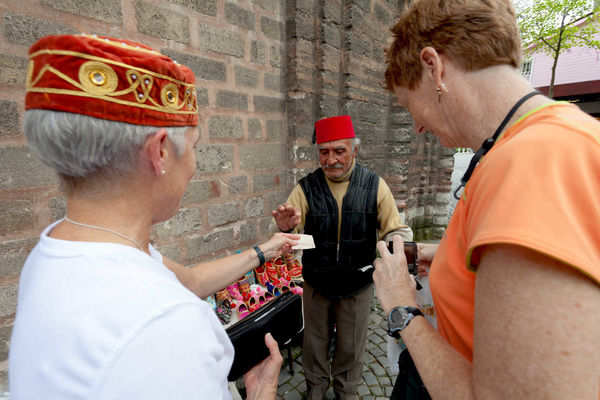How to Haggle: Tips for Bargaining Overseas


By Rick Steves
In some parts of the Mediterranean world, the price tag is only an excuse to argue. Bargaining is the accepted and expected method of finding a compromise between the wishful thinking of the merchant and the tourist. You can generally consider prices soft at flea markets, touristy souvenir shops, and street stalls, but not at modern stores or shopping malls. (Note that bargaining applies to goods, not to food sold at stands or outdoor produce markets.)
Here are a few guidelines to help you get the best bargain:
Determine if bargaining is appropriate. It's bad shopping etiquette to "make an offer" for a hat in a London department store. It's foolish not to at a Greek flea market. To learn if prices are fixed, show some interest in an item but say, "It's just too much money." You've put the merchants in a position to make the first offer. If they come down even 2 percent, there's nothing sacred about the price tag. Haggle away.
Shop around to find out what locals pay. Prices can vary drastically among vendors at the same flea market, and even at the same stall. If prices aren't marked, assume there's a double price standard: one for locals and one for you. If only tourists buy the item you're pricing, watch to see what a tourist from elsewhere in Europe would be charged. I remember thinking I did well in Istanbul's Grand Bazaar, until I learned my Spanish friend bought the same shirt for 30 percent less. Merchants assume American tourists are rich, and they know what we pay for things at home.
Decide what the item is worth to you. Marked prices can distort your idea of an item's true worth. The merchants are playing a psychological game. Many tourists think that if they can cut the price by 50 percent they are doing great. So merchants quadruple their prices and tourists happily pay double the fair value. The best way to deal with crazy price tags is to ignore them. Before you even find out the price, determine the item's value to you considering the hass;e omvolved in packing it or shipping it home.
Determine the merchant's lowest price. Merchants hate to lose a sale. Work the cost down, but if it doesn't match with the price you have in mind, walk away. That last amount the merchants holler out as you turn the corner is often their best price. If that price is right, go back and buy. Prices often drop at the end of the day, when merchants are about to pack up.
Curb your enthusiasm. As soon as merchants perceive the "I gotta have that!" in you, you'll never get the best price. They assume Americans have the money to buy what they really want. Keep a poker face and don't settle for the first counteroffer.
Employ a third person. Use your friend who is worried about the ever-dwindling budget or who doesn't like the price or who is bored and wants to return to the hotel. This trick can work to bring the price down faster.
Impress merchants with your knowledge. You'll earn some respect — and be more likely to get good quality. For instance, if planning to buy a leather coat in Istanbul or Florence, talk to leather-coat sellers and do some research before your trip so you're better prepared to confidently pick one out.
Ask for a deal on multiple items. See if merchants will give you a better price if you buy in bulk (three necklaces instead of one). The more they think they can sell, the more flexible they may become.
Offer to pay cash at stalls that take credit cards. You can expect to pay cash for most things at street markets, but some merchants who sell pricier goods (nice jewelry, artwork, etc.) take credit cards, too. They're often more willing to strike a deal if you pay cash, since they don't lose any profit to credit-card fees.
Show merchants your money. Physically hold out what you are willing to spend and offer "all you have" to pay for whatever you're bickering over. Salespeople could be tempted to just grab your money and say, "Oh, OK."
Obey the rules. Don't hurry. Bargaining is rarely rushed. Make sure you are dealing with someone who has the authority to bend a price downward. Bid respectfully. If a merchant accepts your price (or vice versa), you must buy the item.
If the price is too high, leave. Never worry about having taken too much of someone's time. Merchants are experienced businesspeople who know they won't close every deal.

